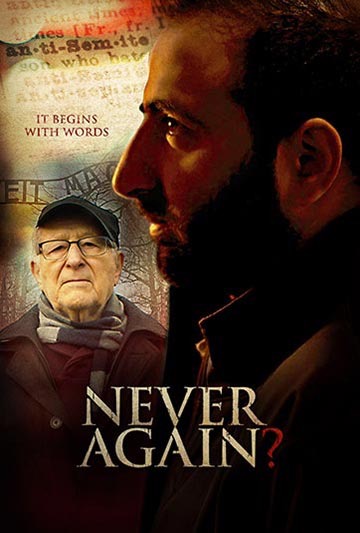 By Jacob Sahms
By Jacob Sahms
Kasim Hafeez grew up in England as a fan of the Chelsea Blues, but his young adulthood included a radicalized hate of Israel after years of exposure to beliefs that condemned Western thought and Semitic beliefs and peoples. Alan Dershowitz’s book sent him on a journey through Israel in 2007 where he built relationships that changed his life. Through conversations with archeologists, historians and religious leaders, he discovered a different perspective than the one he was taught, including that of ninety-year-old Holocaust survivor Irving Roth, who endured brutalities at Auschwitz and Buchenwald. Together, their story became one – that of the documentary Never Again?, in theaters nationwide on October 13 and 15.
Hafeez calls the experience of seeing the film about his own unpacking of his past as surreal, as he continues to lobby worldwide for people to re-engage their humanity and that of each other. He says that people must step outside of the echo chamber they find themselves in, to discover what truth lies outside.
“Real love comes from when we’re willing to be uncomfortable,” he says. When we challenge ourselves. There are things or opinions I held that are continually challenged. For me, the movie has been part of my spiritual and personal growth.”
The negative views he had of Jews and Israel were tied to historical events, Islamic scripture, and the modern political realities of the Middle East, Hafeez explained. They became transferred down through myths, like the one his father told about Adolf Hitler being a great man. Hafeez’s father didn’t know any Jews, and failed to acknowledge that Hitler would’ve killed the Hafeez family because of their skin color. But the myths were repeated so frequently that they became the reality in young Kasim.
Now that he’s been to Israel and built relationships, Hafeez has become a bridge builder, intent on disseminating new information. But he says it’s important to listen first, to understand where the other person is coming from even when you disagree.
“Sometimes you charge straight into [trying to fix the conversation],” Hafeez acknowledged. “Bridge builders need to listen to other people’s experiences. I have a million things I can say or do, but to listen to their stories of what is happening on the ground is necessary to build bridges.”
Hafeez is now a Christian, after years when he’d lost all faith. His Islamic faith was tied to the lies he was told, and when they collapsed, so did his faith. But the film helped him confront parts of his past that he’d compartmentalized. “I had to deal with the guilt, the shame, and the frustration,” he admitted. “The film helped me heal in a way that was safe to move forward. If I hadn’t, it would’ve been difficult to ever get here. Now, I’m focused on the importance of standing up for what’s right and what’s just, trying to love others even when we think differently or have different approaches.”
Check out Never Again? in theaters to see more of Hafeez’s story. For Dove’s family-friendly take on the film, visit: https://dove.org/review/21648-never-again/.




